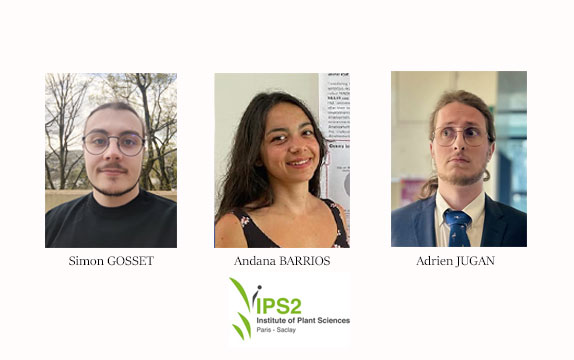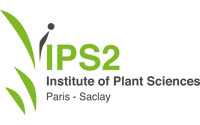Theses defended at IPS2 in early 2024
Simon Gosset
Annotation of the Arabidopsis thaliana proteome via the analysis and prediction of its interactome
Keywords: Protein-protein interaction, protein complex, interactome, annotation, network, AlphaFold
Living cells function thanks to a set of interactions between proteins. Identifying the pairs of proteins involved in these interactions (PPIs) provides a better global understanding of their function in biological processes. There are several experimental methods for identifying protein interactions, but they are too expensive to explore all of them. During my PhD thesis in the OGE team of IPS2, to meet this need, I have developed computational methods to predict protein interactions. I set up a method for predicting protein-protein interactions using Alphafold-multimer. At the same time, I produced a dataset describing the physico-chemical characteristics of a large number of proteins to understand what distinguishes correctly predicted PPIs from incorrectly predicted ones by the method I have set up.
PhD defense: 2nd of February 2024
PhD supervisor: Marie-Hélène Mucchielli Giorgi (IPS2, Saclay)
--------------------------------------
Adrien JUGAN
Cover crops: a tool to shape the soil microbial communities ?
Key-words: Cover crops, Metabarcoding, Soil, Diversity, SynComs
Cover crops constitute a major lever of agriculture. They provide multiple ecosystemic services relying notably on the soil microbial richness, also known as microbiota. The French company Cérience possesses a plant catalog encompassing several varieties of oats (grass) and vetches (legumes), without precise knowledge on their ability to interact with the soil microbiome. My “Cifre” thesis (academic-private collaboration) aimed at studying the impact of the genetic complexity of the cover crop on the soil microbial communities (the rhizosphere). Through a 3-years field experiment in cultural rotation, we identified specific microbial clusters as indicators of cover microbiome. A complementary approach using Synthetic Communities (SynComs) revealed the consequences of bacterial enrichment on the diversity of the rhizospheric communities.
PhD defense: February 13, 2024
PhD co-supervisors: Dr. P. Ratet (IPS2-Saclay), Dr. N. Harzic (Cerience) et Dr. S. Mondy (INRAE, Dijon)
-----------------------------------------
Andana BARRIOS
Long non-coding RNAs: a role in modulating the activity of transcription factors in Arabidopsis thaliana?
Keywords: long non-coding RNA, transcription factor, root development, Arabidopsis, heat stress
Plant roots can change their growth to adapt to the environment, and this depends on how certain genes are switched on or off. During my PhD thesis, we explored two transcription factors, NF-YA10 and NF-YA2, which play a crucial role in this process. Using advanced technologies for phenotyping, molecular and cell biology experiments, we shed light on how these proteins affect root system architecture. We have also discovered that they interact with a long non-coding RNA called AtBAMBOO. AtBAMBOO appears to partially change the subcellular localisation of NF-YA2 in the cell, thus altering the regulation of genes targeted by NF-YA2. We also found that AtBAMBOO is able to displace NF-YA2 from the promoters of its target genes. This long non-coding RNA therefore seems to play a specific role in root development, but also in response to environmental perturbations such as heat stress.
PhD defense: 4th of Avril 2024
PhD co-supervisors: Federico Ariel (IAL, Argentine) and Martin Crespi (IPS2, Saclay)

14/05/2024
